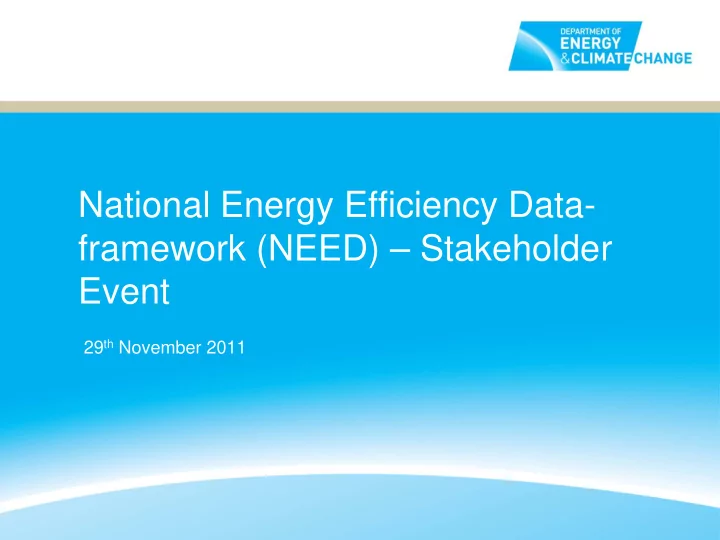

National Energy Efficiency Data- framework (NEED) – Stakeholder Event 29 th November 2011
NEED Stakeholder Event As part of NEED stakeholder engagement, an event was held on 29 th November 2011. The event was intended to: •Improve stakeholders knowledge of NEED and it’s potential. •Help DECC learn how NEED has been used so far and capture views on how initial analysis could be improved. •Gain knowledge of other relevant research and ideas for future work. •Understand stakeholders’ priorities for the future of NEED. Attendees included: Academics Devolved Administrations Other Government Departments Others – such as Local Authorities, EST, Ofgem The following slides provide a summary of the event.
Priorities from Stakeholder Event A large range of ideas for the future of NEED Matching Anonymised were suggested with EPC Dataset at the event (see data following slides), these were then refined to give a Priorities short list of Develop priorities for the model of Links with future of NEED. consumption Fuel Poverty More about households without measures
Ideas - domestic • Understanding rates of take up of different energy efficiency measures. • Understand characteristics of low & high energy users. • Distribution of savings from energy efficiency measures. Research using • More about households not installing energy efficiency measures (“control current data group”). • Technical potential of energy efficiency measures v observed saving. • Anonymised dataset for external use (subject to data protection). • Refined regression analysis, inc. panel regression • Improve understanding of measures not picked up in HEED (“hidden measures”). • More about electrically heated and off gas homes. • Improve understanding of comfort taking, looking at housing types and consumer types (& winter comfort levels pre measure). • Impact of change of occupant on energy use. • Energy savings by fuel poverty status. Research requiring new • Impact of insulation in areas with high radon levels. data • Understand how “leaky” a home is pre and post insulation. • Characteristics of those who show an interest in energy efficiency measures but decide not to install measures • New social trends e.g. impacts of people working from home. • Calculating peak gas demand. • Deaths from cold weather. • Understanding the customer journey and how this might be relevant in other Other ideas for circumstances would feed into Customer Insight. related future • Understanding more about metered water might provide insight into use of research metered gas and electricity.
Ideas - non-domestic Matching with Energy Intensity of Energy Model of energy buildings (by Performance demand industry) Certificates (EPCs) Distribution of Analysis of change energy use (by of occupant building/sector)
Other discussion from Stakeholder Event Additional Variables/data Other relevant research Feedback on NEED Report • Modelled consumption • Widen et al (2009) - • Aware of the report Constructing load profiles for • Number of occupants • Generally used to validate households electricity and their research • EDRP trials data hot water from time use • Publish data in SPSS format • Change in owner or occupier data. (not just Excel) – land registry • Choudhary (2011) Energy • More detail about methods • Welsh Health Data Analysis of the Non- (e.g weather correction & • Sales of non-metered Domestic Building Stock of control group) fuels/off gas grid properties Greater London. • Consider Peer Review for • EPC/DEC data • BREEAM. future outputs. • Method of payment • Scott Kelly: Do homes that • More on other possible data • Other property attribute data are more energy efficient • Unadjusted gas consume less energy? consumption • The Centre for Research in • Internal temperature the Built Environment - non- domestic Green leases.
Future Plans Beyond Autumn 2012 • Medium Term • Publication including: • Input into DECC policy • Further information on energy development and evaluations. consumption by property type. • Inclusion of EPC data in NEED. • Updated information on impacts of measures (including refining • Long Term methodology and inclusion of data • Production of an anonymised for additional years). dataset for use by academics. • More details of methodology and • Development of evidence for QA. Scotland. • (Potential) Initial non-domestic • Develop non-domestic outputs. results. • Inclusion of new sources of data on microgeneration and heat. • National Statistics outputs.
Recommend
More recommend